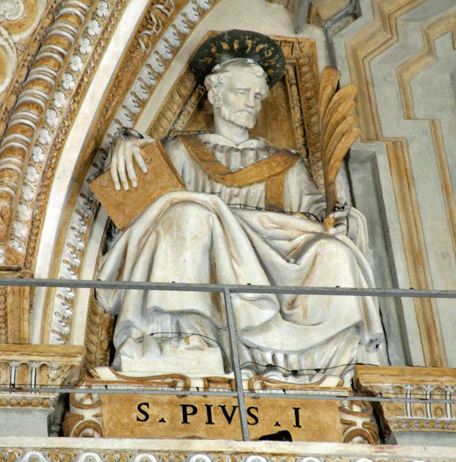

A holy Pope of the second century, the first of the twelve hitherto graced with the name of Pius, rejoices us today with his mild and gentle light. Although Christian society was in a precarious condition under the edicts of persecution, which even the best of the pagan emperors never abrogated, our Saint profited by the comparative peace enjoyed by the Church under Antoninus Pius to strengthen the foundations of the mysterious tower raised by the Divine Shepherd to the honor of the Lord God. He ordained by his supreme authority that, notwithstanding the contrary custom observed in certain places, the Feast of Easter should be celebrated on a Sunday throughout the entire Church. The importance of this measure and its effects upon the whole Church were emphasized during the reign of Pope St. Victor I, near the end of the same century; for it was he who enforced the decree of St. Pius.
The ancient Breviary lesson of St. Pius I made mention of the decree, attributed in the Corpus Juris to this holy Pope, concerning those who carelessly let fall any portion of the Precious Blood of Our Lord during the Holy Sacrifice of the Mass. The prescriptions are such as give evidence of the profound reverence the Pope wished to be shown towards the Most Holy Mystery of the Altar. The penance enjoined is to be of forty days if the Precious Blood had fallen to the ground; and wheresoever it fell, it must, if possible, be taken up with the lips, the dust must be burned, and the ashes thereof put in a consecrated place.
In more recent times the Breviary Lesson runs thus:
St. Pius, the first of this name, a citizen of Aquileia (60 miles east of Venice, Italy), and son of Rufinus, was priest of the holy Roman Church. During the reign of Antoninus Pius and Marcus Aurelius he was chosen Sovereign Pontiff. In five ordinations which he held in the month of December, he ordained twelve bishops and eighteen priests. Several admirable decrees of his are still extant: in particular that which ordains that the Resurrection of Our Lord is always to be celebrated on a Sunday. He changed the house of Pudens into a church, and because it surpassed the other titles in dignity, inasmuch as the Roman Pontiffs made it their dwelling-place, he dedicated it under the title of Pastor. Here he often celebrated the Holy Mysteries, baptized many who had been converted to the Faith, and enrolled them in the ranks of the faithful. While he was thus fulfilling the duties of a good shepherd, he shed his blood for his sheep and for Christ the Supreme Pastor, being crowned with martyrdom on the fifth of the Ides of July. He was buried in the Vatican.
We call to mind, O glorious Pontiff, those words written under thine eye, which seem to be a commentary on thy decree concerning the Sacred Mysteries: "We receive not," cried St. Justin the Philosopher to the world of that second century, "we receive not as common bread, nor as common drink, the Food which we call the Eucharist; but just as Jesus Christ our Savior, being made flesh by the word of God, had both Flesh and Blood for our salvation, so have we been taught that the Food made Eucharist by the prayer formed of His own word, is both the Flesh and Blood of this Jesus, Who is made flesh" (Apolog. I 66). This doctrine and the measures it so fully justifies, found, towards the close of the same century, other authentic witnesses who, in their turn, would almost seem to be quoting from the prescriptions attributed to thee. "We are in the greatest distress," said Tertullian, "if the least drop from our chalice, or the least crumb of our Bread fall to the ground" (De Corona, III). And Origen appealed to the initiated to bear witness to "the care and veneration with which the sacred gifts were surrounded, for fear the smallest particle should fall; which, if it happened through negligence, would be considered a crime" (In Ex. Homil., 13). And yet in our days heresy, as destitute of knowledge as of faith, pretends that the Church has departed from Her ancient traditions by paying exaggerated homage to the Divine Sacrament. Obtain for us, O St. Pius, the grace to return to the veneration and love with which that Faith inspired them for the Chalice of the Most Precious Blood of Jesus, that richest treasure of earth. May the Pasch of the Lamb (the Easter Liturgy) unite, as thou didst desire, in one uniform celebration, all who have the honor to truly bear the name of Christian!
Contact us: smr@salvemariaregina.info
Visit also: www.marienfried.com